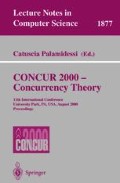Abstract
Model checking based on the causal partial order semantics of Petri nets is an approach widely applied to cope with the state space explosion problem. One of the ways to exploit such a semantics is to consider (finite prefixes of) net unfoldings — themselves a class of acyclic Petri nets — which contain enough information, albeit implicit, to reason about the reachable markings of the original Petri nets. In [15], a verification technique for net unfoldings was proposed in which deadlock detection was reduced to a mixed integer linear programming problem. In this paper, we present a further development of this approach. We adopt Contejean-Devie’s algorithm for solving systems of linear constraints over the natural numbers domain and refine it, by taking advantage of the specific properties of systems of linear constraints to be solved. The essence of the proposed modifications is to transfer the information about causality and conflicts between the events involved in an unfolding, into a relationship between the corresponding integer variables in the system of linear constraints. Experimental results demonstrate that the new technique achieves significant speedups.
Access this chapter
Tax calculation will be finalised at checkout
Purchases are for personal use only
Preview
Unable to display preview. Download preview PDF.
References
F. Ajili and E. Contejean: Complete Solving of Linear Diophantine Equations and Inequations Without Adding Variables. Proc. of 1st International Conference on principles and practice of Constraint Programming, Cassis (1995) 1–17.
F. Ajili and E. Contejean: Avoiding Slack Variables in the Solving of Linear Diophantine Equations and Inequations. Theoretical Comp. Sci. 173 (1997) 183–208.
E. Best and B. Grahlmann: PEP — more than a Petri Net Tool. Proc. of TACAS’96: Tools and Algorithms for the Construction and Analysis of Systems, Margaria T., Steffen B. (Eds.). Springer-Verlag, Lecture Notes in Computer Science 1055 (1996) 397–401.
E. M. Clarke, E. A. Emerson and A. P. Sistla: Automatic Verification of Finite-state Concurrent Systems Using Temporal Logic Specifications. ACM TOPLAS 8 (1986) 244–263.
E. Contejean: Solving Linear Diophantine Constraints Incrementally. Proc. of 10th Int. Conf. on Logic Programming, D. S. Warren (Ed.). MIT Press (1993) 532–549.
E. Contejean and H. Devie: Solving Systems of Linear Diophantine Equations. Proc. of 3rd Workshop on Unification, University of Keiserlautern (1989).
E. Contejean and H. Devie: An Efficient Incremental Algorithm for Solving Systems of Linear Diophantine Equations. Inf. and Computation 113 (1994) 143–172.
CPLEX Corporation: CPLEX 3.0. Manual (1995).
J. Engelfriet: Branching processes of Petri Nets. Acta Inf. 28 (1991) 575–591.
J. Esparza, S. Römer and W. Vogler: An Improvement of McMillan’s Unfolding Algorithm. Proc. of TACAS’96: Tools and Algorithms for the Construction and Analysis of Systems, Margaria T., Steffen B. (Eds.). Springer-Verlag, Lecture Notes in Computer Science 1055 (1996) 87–106.
J. Esparza: Model Checking Based on Branching Processes. Science of Computer Programming 23 (1994) 151–195.
V. Khomenko and M. Koutny: Deadlock Checking Using Liner Programming and Partial Order Dependencies. Teachnical Report CS-TR-695, Department of Computing Science, University of Newcastle (2000).
S. Krivoi: About Some Methods of Solving and Feasibility Criteria of Linear Diophantine Equations over Natural Numbers Domain (in Russian). Cybernetics and System Analysis 4 (1999) 12–36.
K. L. McMillan: Using Unfoldings to Avoid State Explosion Problem in the Verification of Asynchronous Circuits. Proc. of CAV’92, Springer-Verlag, Lecture Notes in Computer Science 663 (1992) 164–174.
S. Melzer and S. Römer: Deadlock Checking Using Net Unfoldings. Proc. of CAV’97, O. Grumberg (Ed.). Springer-Verlag, Lecture Notes in Computer Science 1254 (1997) 352–363.
Author information
Authors and Affiliations
Editor information
Editors and Affiliations
Rights and permissions
Copyright information
© 2000 Springer-Verlag Berlin Heidelberg
About this paper
Cite this paper
Khomenko, V., Koutny, M. (2000). LP Deadlock Checking Using Partial Order Dependencies. In: Palamidessi, C. (eds) CONCUR 2000 — Concurrency Theory. CONCUR 2000. Lecture Notes in Computer Science, vol 1877. Springer, Berlin, Heidelberg. https://doi.org/10.1007/3-540-44618-4_30
Download citation
DOI: https://doi.org/10.1007/3-540-44618-4_30
Published:
Publisher Name: Springer, Berlin, Heidelberg
Print ISBN: 978-3-540-67897-7
Online ISBN: 978-3-540-44618-7
eBook Packages: Springer Book Archive

